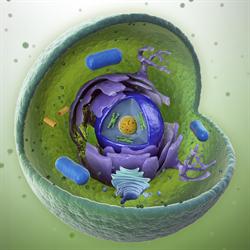Honors & News
Researchers Receive $1.4M to Study Gene Therapy and DNA Delivery
Tuesday, December 2, 2014

Since its discovery several decades ago, gene therapy has been a medicinal sphinx, with doctors as enamored by its potential as they are frustrated by the riddles it presents. Researchers at the University of Rochester Medical Center are working to solve one of those riddles.
In order for gene therapy to be effective, doctors must discern how to deliver DNA to a cell's nucleus, which requires a comprehensive understanding of how DNA and proteins move through cell cytoplasm. Knowledge of this system could lead to huge leaps in gene therapy effectiveness, and could potentially allow researchers to push forward on research into many currently-untreatable diseases.
The research is supported by a 4-year, $1.4 million grant from the National Institutes of Health. One of the best examples is cystic fibrosis,
said David A. Dean, Ph.D., professor of Pediatrics and Neonatology at
URMC and the study's lead researcher. For cystic fibrosis, we know what the affected gene is, and we know what
the mutation is. We know the physiology. The road block is the delivery - getting the corrective DNA in there
and to the right cells for the right amount of time.